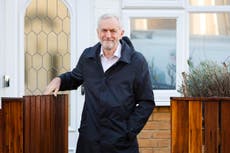Jeremy Corbyn really doesn’t want a second referendum
The Labour leader seems determined to ignore what his members think – by which I mean he adheres unflinchingly to his principles

The point of Jeremy Corbyn is that he sticks to what he believes. So Labour supporters should not be surprised by his interview today, in which he repeats the policy he has set out since the EU referendum.
Most Labour Party members want to stay in the EU, and they can see the chance now, as public opinion is shifting, parliament is deadlocked and the route to a second referendum seems to be opening up. Now is surely the time, they say, for the leader to come out in favour of “going back to the people”.
But no, he refuses even to engage with the question. When Heather Stewart of The Guardian asked gently if he could imagine a referendum emerging as the solution, he said: “I think we should vote down this deal; we should then go back to the EU with a discussion about a customs union.”
He appears to think he can force the government to negotiate a new deal, or that there could be a general election after which there would be time for an incoming Labour government to negotiate it before 29 March. “You’d have to go back and negotiate, and see what the timetable would be,” he said.
What I thought most striking about the interview, though, was his comment about EU state aid rules: “I don’t want to be told by somebody else that we can’t use state aid in order to be able to develop industry in this country.” That is a pure sovereignty argument from a lifelong believer in “socialism in one country”.
Again and again, Corbyn’s true colours show through, but people see in him what they want to see, and he has been surprisingly adept at the ambiguity needed to keep the show on the road.
We are close to the time, though, when the gap between Leave and Remain cannot be bridged. Keir Starmer, the shadow Brexit secretary, said at the end of November: “That chance to get the right deal has now gone.” He hinted the party’s choice was now between forcing the government to delay Brexit to hold a referendum and accepting the prime minister’s deal, although “the more I read it the worse I think it is”.
And John McDonnell, the shadow chancellor seen by some as more flexible than Corbyn about a referendum, told The Times today that the party’s overwhelmingly pro-EU members wouldn’t get to decide: “I can’t see it, but anything can happen. At the moment, it’ll be the usual consultations that will decide it.”
He refused to say what he and Corbyn would do if, as expected, Theresa May loses the vote on the Brexit deal on or about 15 January: “It depends on those unique circumstances and, of course, it depends on the Democratic Unionist Party.” Thus Labour’s strategy as an opposition has been contracted out to the hard men and women of Ulster.
Sometimes the irony is so loud it clangs.
What will happen? It seems most likely that the prime minister will negotiate a codicil to the withdrawal agreement with the EU, which will fail to satisfy the DUP but which might allow some Conservative MPs to say they will now back the deal.
She may postpone the vote again, but when she eventually holds it she will probably lose by 50-100. Then Corbyn might finally table a motion of no confidence in the government, but lose it, because the DUP says it will support the government as long as the Brexit deal fails to go through.
At this point Corbyn has to decide whether to argue for delay and a referendum. It currently looks as if he will resist the pressure from his party to do so. In which case, parliament will probably vote on various options and against them all: a no-deal Brexit; a Norway Plus option (although that is essentially the same as May’s deal in that it would involve a similar withdrawal agreement with the same guarantee of an open border in Ireland); and a referendum.
Then parliament would be left with a choice between leaving without a deal and going back to May’s deal. The House of Commons can pass non-binding motions saying how much it disapproves of a no-deal Brexit, but unless it votes for the deal it cannot stop it. The only other option is to delay Brexit, which could only be for a few weeks to complete legislation to implement the deal, or for longer for a referendum, which Corbyn seems determined to avoid.
If Corbyn continues to ignore Labour members – by which, of course, I mean if he continues to adhere unflinchingly to his principles – then the prime minister will make the House of Commons vote, and vote again, until enough Labour MPs have either voted or abstained to allow her deal to be ratified.
Then the DUP might vote with Labour to try to force a general election, and May would need maybe just one or two Labour MPs – or former Labour MPs, of whom there are five in the Commons – to keep the deal on track.
The constitutional crisis is only just beginning.



Join our commenting forum
Join thought-provoking conversations, follow other Independent readers and see their replies